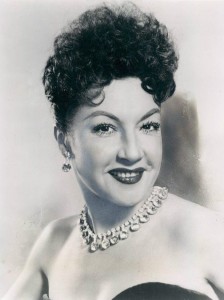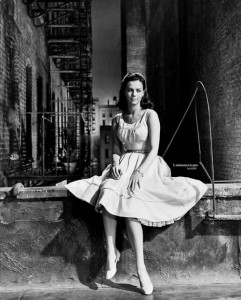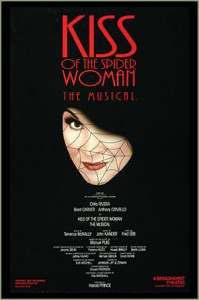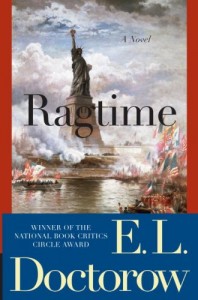In which Daniel ponders the grievous misrepresentation of minorities in musical theater.
To my dear reader,
At the end of this previous semester, the Unviersity of Puget Sound’s theater department put on a a condensed version of Shakespeare’s Hamlet, wherein the character of Hamlet was played by (and referred to by other characters as) a woman. This, effectively, made her relationship with the character of Ofelia a lesbian romance, an aspect that was never explicitly made note of by the other characters. I was greatly impressed by the work, and pleased that a queer relationship had been made visible to the audience without fuss, but what has stuck with me from that production was one of the hand-written signs that decorated the entrance to the theater. The play’s script had been edited down to highlight certain themes, among them rebellion and social injustice, and so one hand-written sign beside the door said something along the lines of the following message:
If you want to change the world, stop asking for permission.
These may not be the exact words. There is another, similar, anonymous quote that goes “If you want to achieve greatness, stop asking for permission,” and it is possible that is what it said. But regardless, what I thought it said got me thinking about the odd relationship between minorities – and more specifically, the queer community – and theater.
There have been many works of literature discussing the subject. These books have generally suggested the same thing: when Broadway was first rising in prominence as a source of American entertainment, it was an enormous draw to minorities (queers, immigrants, Jews, etc.) because such people could not find “respectable employment” and Broadway was not considered a respectable place. What many of these books also suggest, however, is that, despite the huge proportion of queer people that Broadway has employed, queers (and most other minorities) were almost never represented on Broadway because musical theater was a machine that perpetuated white and heteronormative culture.
In some small ways, this is untrue. Although white heterosexual love stories were and are the norm of musical theater, it provided an opportunity for queer men and women to earn an income from their “unrespectable” talents (i.e. singing, dancing, songwriting, etc). In particular, Broadway brought the icon image of the proud diva to the forefront of American imagination, allowing for female leads with strong vocals and even stronger personalities to dominate the stage in a way that women have rarely been allowed to dominate in other areas of life. Queer singer and actress Ethel Merman belted out “Everything’s Coming Up Roses” in Gypsy, and there was no denying her presence.
In many other ways, however, this is very true. Looking at lists of the most famous and successful musicals of all time – Phantom of the Opera, Bye Bye Birdie, My Fair Lady, etc. – almost all of them concern a white man and a white women falling in or out of love. In the unlikely event that a minority is represented, it is usually done inaccurately and insensitively, such as when white actress Natalie Wood portrayed Puero Rican Maria in the film adaptation West Side Story.
That alone is ridiculous. Admittedly, such a famous actress may have been necessary to the success of the film, but the entire point of the story is that the male lead is white and the female lead IS NOT. Natalie Wood did not even sing Maria’s songs in the film; another actress was hired to dub it in for her. By casting a famous white actress over a less famous Latina actress (who might have even been able to sing in a musical), musical theater again perpetuated the underlying sentiment that people that are not white and not heterosexual are a tool for those that are. In this case, this story of racial prejudice became, to a degree, merely a tool for pretty white people to sing some nice songs.
Even in rare cases when minorities are portrayed, they are usually done so insensitively and inaccurately. Such an example is that of the 1990s musical Kiss of the Spider Women, which tells the tale of two prisoners in a Latin American jail – one man an effeminate gay man that uses his imagination to escape the brutal reality, and the other a serious, heterosexual revolutionary. The fact that a Broadway musical of the time would explicitly involve gay main character is surprising, yet the trajectory of the story – in which the gay character is manipulated into betraying the revolutionary’s secrets, falls in love with the revolutionary, and dies after being used by both the revolutionary and the police.
Throughout this story, the gay man is a victim and a puppet. He dies at the end because he is gay, and therefore at such odds with his surroundings that he must either assimilate or be eliminated. Admittedly, credit must be given where credit is due: a musical whose protagonist is queer is a remarkable and wonderful thing. But the problem remains that the queer community is still being understood on other people’s terms.
Straight people still primarily think of a white gay man when considering the queer community. Queerness is still considered, by much of the world, to be considered a “white man’s disease,” making queerness in other ethnicities a foreign concept. We are still thought of as being divided into cis-gender men and cis-gender women, despite our ranks of non-gender-binary community members. We are still tools to be used, laughed at, and played with, but so rarely recognized as people.
Great strides have been made in recent history to improve the visibility and image of the queer community, and minorities as a whole, in entertainment and media. But we are still being understood as others by mainstream America, and are being understood on their terms. I am asking for this to change. I am not asking for permission.
With all due respect,
Daniel Wolfert




![0502150032a[1]](https://blogs.pugetsound.edu/whatwedo/files/2015/05/0502150032a1-300x169.jpg)

![0504150342[1]](https://blogs.pugetsound.edu/whatwedo/files/2015/05/05041503421-e1430957837231-169x300.jpg)